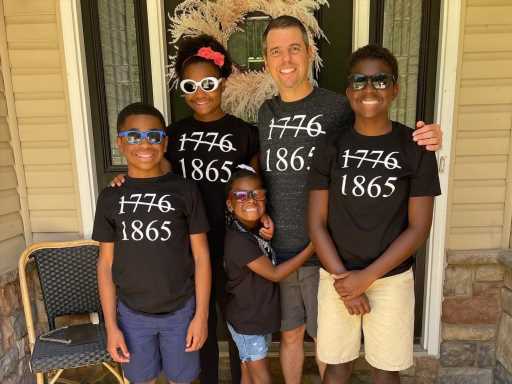My husband and I are our children’s second and chosen parents. Each of our four children came to us by domestic, infant, transracial, and open adoption. Despite the questions we get about who our children’s “real” parents are or if our children are “real siblings” or not, we are a very real and large family, comprised of biology and adoption.
Every Father’s Day, just like every Mother’s Day, we choose to mail greeting cards to the dads whom we love. This includes our kids’ biological (also known as first or birth) fathers who play an active part in their (our) children’s lives.
I know that many people find our family dynamic strange and mysterious. How can there be room for both sets of parents in a child’s life? Does the child feel they must choose between us? The answer is that open adoption — though a work in progress — can be beautiful, unified, and healthy. It takes all parties working together, lots of communication, and plenty of respect. To us, a fruitful open adoption benefits the child — the adoptee — the most. Everything we do is for them.
Some wonder why we would “share” our special parental holiday with our children’s biological parents. Why would we honor the parents who don’t raise the kids, don’t live with them, and don’t do the day-to-day parenting? The answer is simple. We love them, they love us, and together, we love the child. We don’t compete with one another. We acknowledge that we each play different roles in the child’s life, but we share one thing in common: Each of us is some form of mom or dad.
You might be wondering if it’s difficult to find greeting cards for our situation — and the answer is yes. First, some of the cards I wouldn’t buy any dad, because they’re overly cheesy. (Think tools, grills, or fishing-themed clichés.) Also, most cards just can’t describe the relationship we have with our kids’ first fathers. Searching for the right card takes time and energy, but it’s well worth it. We usually find something that goes along the lines of a generic “Happy Father’s Day.” Then we personalize it with a hand-written message.
When adopting, a lot of emphasis is placed on the birth mother — her decision, her grief, and her yearnings. However, we believe that the birth father is just as important, and we choose to honor him on Father’s Day, just as we honor our kids’ birth mothers on Mother’s Day. We want our kids’ first parents to know that we will not ever forget them, and we want to acknowledge the important and ongoing role that some of them have in our children’s lives.
Now, I’m not naïve enough to think that a card can sum up the complexity of our relationship. Adoption can certainly be beautiful, but it is also intricate and multi-faceted. Each of our children have their own adoption story, and like all relationships, our adoptions came with plenty of heartache. An adoption is a one-time legal event, but it’s certainly not a one-time emotional event.
We’ve faced our fair share of ups and downs, but we’ve remained relentlessly committed to the well-being of our shared children. My husband and I have been adoptive parents for nearly fifteen years. We’ve changed and grown (thankfully) and so have their birth parents. We’ve welcomed new biological siblings and witnessed graduations and weddings. We’ve had multiple in-person visits, numerous texts, and video chats.
Certainly, a once-a-year greeting card cannot sum up this distinct and evolving adoption journey. Father’s Day, just like Mother’s Day, is brings about intricate feelings that interweave grief, joy, reflection, and hopefulness. I truly don’t believe a single adoption exists without deep-rooted loss. A card can’t wash these feelings away.
However, we believe that building and maintaining these important relationships can include actions, year-round, that let our kids’ first families know that we love them. Father’s Day is an opportunity not only to celebrate all the dads we love, but to embrace our family’s complex, unique, and beautiful reality.
Source: Read Full Article

